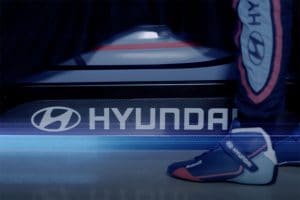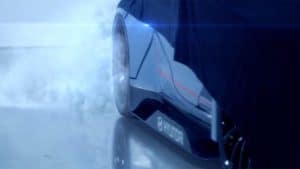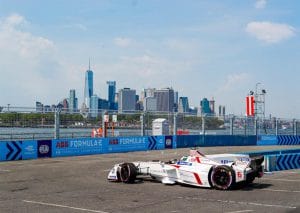While battery power is still struggling to gain traction in the consumer market, it is accelerating fast on the race track as a growing number of motor sports series – and automaker race programs – adopt various forms of electrification.
Two of the newest manufacturers set to plug in are Hyundai, which will preview an all-electric race car at the Frankfurt Motor Show next month, as well as Honda, which says it will return to next year’s IndyCar series with a hybrid-powered racer delivering “more than 900 horsepower.”
“Racing has long been a crucible for the development of new technologies and people at Honda and this direction will enable us to promote a technology through racing that is essential to the future of our automobile business,” said Ted Klaus, president of Honda Performance Development.
(Formula E Charged UP After Successful Fifth Season Wraps Up)
The two announcements come just weeks after the conclusion of the fifth season of the Formula E series. That’s an all-electric program that has gained significant momentum over the last several years.
Earlier this month, IndyCar announced that it will switch to hybrid technology with the launch of the 2022 series. Both Honda and its arch-competitor Chevrolet will join in on the switch.
As with a conventional hybrid vehicle, the powertrains for the open-car race series will pair an internal combustion engine with an electric drive system though, in this case, that will be one specifically developed for motorsports using a “multi-phase motor, inverter and electric storage device that will create energy recovery from the car’s braking system.”
Currently, IndyCars can produce as much as 700 horsepower. That will jump to 900 with the hybrids, but that could understate the boost batteries will give since electric motors can generate 100% of their torque the moment they switch on.
IndyCar actually is a belated entry into hybridization, following both Formula One – which introduced the kinetic energy recovery system, or KERS, to racing – and the Le Mans endurance race series.
(Rushing to Extremes: Formula E Adding Extreme E Electric Off-Road Racing Series)
What is unclear is where Hyundai plans to take the all-electric race car it says it is developing, and which it will introduce at the Frankfurt Motor Show a month from now.
There is speculation that the project could be teaming Hyundai with battery supercar company Rimac. The Korean automaker in May announced it would invest $90 million in the Croatian start-up, though it was vague about what their plans were beyond developing an EV model that would become part of Hyundai’s new “N” performance sub-brand.
While offering a brief teaser of the car – which looks to be a small hatchback – Hyundai has little to say beyond a terse statement noting, “The move to electric continues the growth of Hyundai Motorsport, which has become well established in rallying and circuit racing since its inception in 2012. The multiple rally-winning WRC team, now in its sixth season, is currently leading a closely fought Manufacturers’ Championship.”
Could Hyundai be targeting the World Rally Championship or perhaps even setting up a series of its own for the upcoming all-electric racer? That wouldn’t be unique. Jaguar set up the I-Pace e-Trophy series to pair with Formula E.
“I think (all auto racing series) will have to go electric or they will have no relevance,” Alejandro Agag, the founder and organizer of Formula E told TheDetroitBureau.com last month.
(Toyota’s Gazoo Racing Teases Planned Hypercar)
While few motorsports analysts expect to see battery-cars completely take over anytime soon, what’s clear is that, as electrification becomes more the norm than the exception, both automakers and auto racing organizers are looking to stay ahead of the curve.



